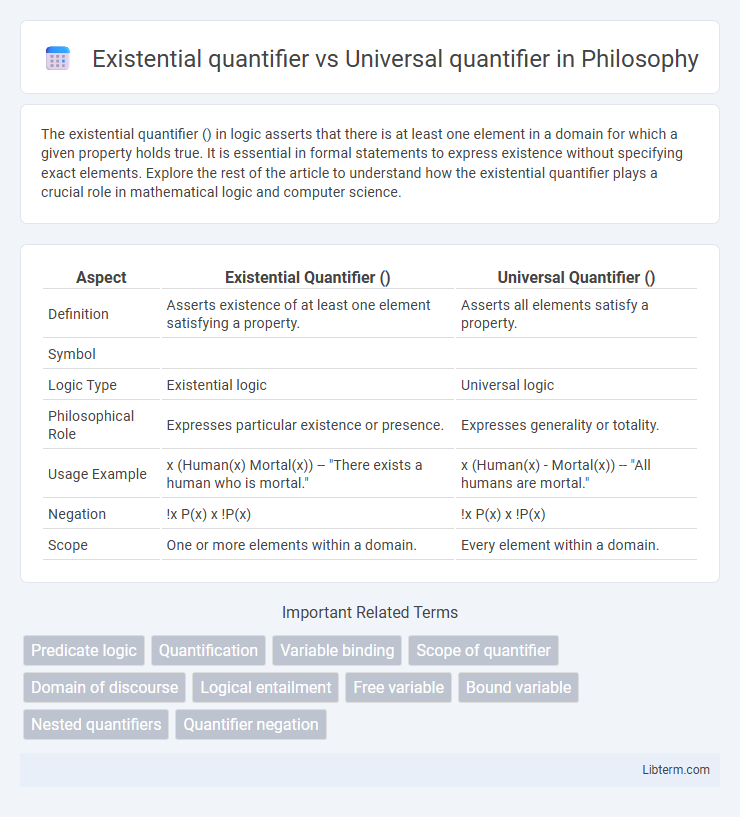The existential quantifier () in logic asserts that there is at least one element in a domain for which a given property holds true. It is essential in formal statements to express existence without specifying exact elements. Explore the rest of the article to understand how the existential quantifier plays a crucial role in mathematical logic and computer science.
Table of Comparison
| Aspect | Existential Quantifier () | Universal Quantifier () |
|---|---|---|
| Definition | Asserts existence of at least one element satisfying a property. | Asserts all elements satisfy a property. |
| Symbol | ||
| Logic Type | Existential logic | Universal logic |
| Philosophical Role | Expresses particular existence or presence. | Expresses generality or totality. |
| Usage Example | x (Human(x) Mortal(x)) -- "There exists a human who is mortal." | x (Human(x) - Mortal(x)) -- "All humans are mortal." |
| Negation | !x P(x) x !P(x) | !x P(x) x !P(x) |
| Scope | One or more elements within a domain. | Every element within a domain. |
Introduction to Quantifiers in Logic
Existential quantifiers assert that there is at least one element in a domain for which a given predicate holds true, typically symbolized as , while universal quantifiers claim that a predicate is true for every element in the domain, denoted as . Understanding the distinction between these quantifiers is fundamental in formal logic for accurately expressing propositions and performing logical inference. Quantifiers enable precise formulation of statements involving generality and existence, playing a crucial role in fields such as mathematics, computer science, and linguistics.
Defining the Existential Quantifier (∃)
The existential quantifier () asserts the existence of at least one element in a domain that satisfies a given property, typically expressed as "there exists an x such that P(x)." This quantifier is fundamental in predicate logic for indicating that a statement holds true for some instance within the specified set. Unlike the universal quantifier (), which applies to all elements, the existential quantifier targets only the presence of one or more qualifying examples.
Defining the Universal Quantifier (∀)
The universal quantifier () denotes that a predicate holds true for all elements within a particular domain, often expressed as x P(x), meaning "for every x, P(x) is true." It serves as a fundamental operator in predicate logic to formulate statements asserting properties or conditions universally applicable. Understanding the universal quantifier is essential for rigorous logical proofs, model theory, and formal verification processes.
Symbolic Representation and Syntax
The existential quantifier is symbolically represented as and indicates that there exists at least one element in the domain for which the predicate holds true, typically written as x P(x). The universal quantifier is denoted by and asserts that a predicate applies to every element within the domain, expressed as x P(x). Symbolically, the syntax differentiates by the quantifier prefix followed by the variable and the predicate, forming the logical formula that defines the scope of the quantification.
Semantic Differences: Existential vs Universal
The existential quantifier () asserts the existence of at least one element in a domain satisfying a given property, emphasizing specific instances or examples. The universal quantifier () affirms that all elements in the domain satisfy the property, highlighting generality and total inclusion. Semantic differences lie in scope: existential quantification conveys existence without universality, whereas universal quantification ensures every element fulfills the predicate.
Examples of Existential Quantifiers in Mathematics
Existential quantifiers in mathematics express that there is at least one element in a set for which a given property holds, symbolized by . For example, the statement x R such that x^2 = 4 asserts the existence of a real number x whose square is 4, meaning x can be 2 or -2. Another example is n N where n > 5, indicating there exists a natural number greater than 5, such as 6 or 7.
Examples of Universal Quantifiers in Mathematics
Universal quantifiers in mathematics are symbolized by and indicate that a property applies to all elements within a specific domain, such as "x R, x2 >= 0," meaning for every real number x, its square is non-negative. Another example is "n N, n + 0 = n," which states that for every natural number n, adding zero yields n itself. These statements emphasize absolute conditions that must hold true for every member of the set under consideration, contrasting with existential quantifiers that assert the existence of at least one such element.
Common Mistakes and Misinterpretations
Confusing existential quantifiers () with universal quantifiers () often leads to errors in logical reasoning, such as interpreting "there exists" statements as applying to all elements or vice versa. Misinterpretations frequently arise from neglecting the scope of quantifiers, causing incorrect generalizations or faulty conclusions in proofs and arguments. Properly distinguishing these quantifiers is crucial for accurately expressing properties about elements within a domain in formal logic.
Applications in Computer Science and Formal Reasoning
Existential quantifiers () express the existence of at least one element satisfying a condition, crucial for database query languages and logic programming to confirm data presence. Universal quantifiers () assert that all elements meet a criterion, essential in formal verification and model checking to ensure system-wide properties. These quantifiers underpin automated theorem proving and type systems, enabling rigorous reasoning about algorithms and software correctness.
Summary: Choosing the Right Quantifier
Existential quantifiers assert the existence of at least one element in a domain satisfying a property, while universal quantifiers declare that all elements in the domain meet the condition. Choosing the right quantifier depends on the logical goal: use existential quantifiers to prove the presence of specific instances and universal quantifiers to establish general truths across entire sets. Precise application of these quantifiers is essential for accurate statements in predicate logic, database queries, and mathematical proofs.
Existential quantifier Infographic

 libterm.com
libterm.com